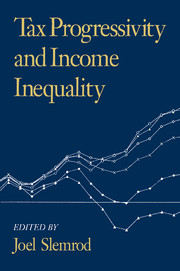Book contents
- Frontmatter
- Contents
- Preface
- List of contributors
- 1 Introduction
- 2 Trends in federal tax progressivity, 1980–93
- COMMENTS
- 3 The lifetime incidence of state and local taxes: measuring changes during the 1980s
- COMMENTS
- 4 Trends in income inequality: the impact of, and implications for, tax policy
- COMMENTS
- 5 The efficiency cost of increased progressivity
- COMMENTS
- 6 On the high-income Laffer curve
- COMMENTS
- 7 Tax progressivity and household portfolios: descriptive evidence from the Survey of Consumer Finances
- COMMENTS
- 8 Progressivity of capital gains taxation with optimal portfolio selection
- COMMENTS
- 9 Perceptions of fairness in the crucible of tax policy
- COMMENTS
- 10 Progressive taxation, equity, and tax design
- Index
COMMENTS
Published online by Cambridge University Press: 20 May 2010
- Frontmatter
- Contents
- Preface
- List of contributors
- 1 Introduction
- 2 Trends in federal tax progressivity, 1980–93
- COMMENTS
- 3 The lifetime incidence of state and local taxes: measuring changes during the 1980s
- COMMENTS
- 4 Trends in income inequality: the impact of, and implications for, tax policy
- COMMENTS
- 5 The efficiency cost of increased progressivity
- COMMENTS
- 6 On the high-income Laffer curve
- COMMENTS
- 7 Tax progressivity and household portfolios: descriptive evidence from the Survey of Consumer Finances
- COMMENTS
- 8 Progressivity of capital gains taxation with optimal portfolio selection
- COMMENTS
- 9 Perceptions of fairness in the crucible of tax policy
- COMMENTS
- 10 Progressive taxation, equity, and tax design
- Index
Summary
This paper is a very nice synopsis of the literature on inequality and its implications for tax policy. The paper has three parts. First, it discusses recent trends in inequality, concluding that inequality has grown enormously. Second, it asks whether tax policy has caused the increased inequality, and concludes that it has not. Third, it considers whether there are tax policies that would reduce inequality, and decides that increasing taxes on the rich may make us feel better but would have little effect on inequality.
I mostly agree with the paper. The empirical work in the first half is sensibly done and convincing, and the conclusions about tax policy seem appropriate. I want to comment on the three parts, however, and ultimately suggest that there are some tax policies that may reduce inequality.
Trends in income inequality
The best way to think about income distribution, it seems to me, is to divide the population into three groups: the very rich (the top 5 percent of the population); the very poor (the bottom 10 percent of the population); and the middle class (the remaining 85 percent). I make this distinction because I think that policy toward the very top of the distribution must confront issues it does not in the middle of the distribution (substantial business and capital income, greater mobility of resources), and because the problems of the very poor probably go beyond having jobs that don't pay much.
- Type
- Chapter
- Information
- Tax Progressivity and Income Inequality , pp. 130 - 136Publisher: Cambridge University PressPrint publication year: 1994



